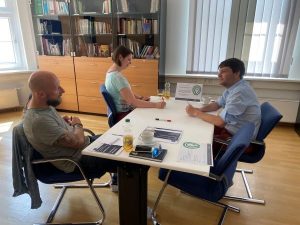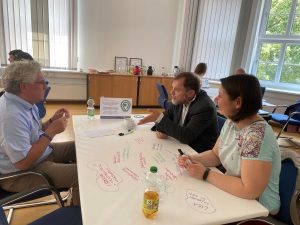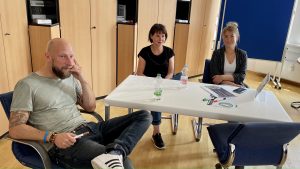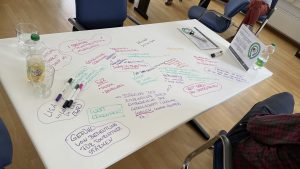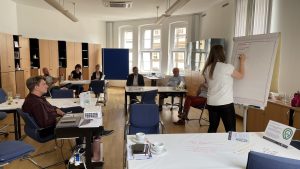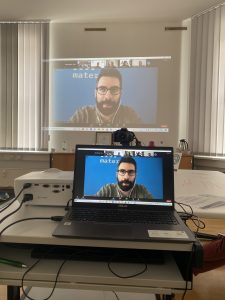As part of the EU project IMPACTOUR, funded by the “Horizon 2020” program of the European Commission, the first regional World Café took place on July 23, 2021 in Magdeburg, Saxony-Anhalt. The event served as preparation for the pan-European and project-related World Café in November in Matera, Italy, which will focus on the exchange of ideas on the subject of cultural tourism and its importance for and influence on the sustainable development of European regions. As the official German IMPACTOUR project partner, the TRANSROMANICA associaition organized this event on the premises of the Tourism Association of Saxony-Anhalt. Actors from the fields of tourism, marketing and research, as well as members of the Cultural Routes of the Council of Europe were invited to share their expertise, experiences and opinions on the subject of cultural tourism in order to include them in the IMPACTOUR project. In this context, all participants were invited to join the Community of Experience in the IMPACTOUR project. The event, which took place simultaneously in the IMPACTOUR regions of Spain, Portugal, Italy, Greece and Germany, consisted of two parts. The first part was carried out in the participating partner regions as a face-to-face or hybrid event in the respective national language. In the second part, the individual regional events were combined in the form of an English-language Zoom conference on a European level. During the World Café, discussions on the domains of „Social Affairs“, „Environment“, „Economy“ and „Culture“ took place in 3 rounds of 20 minutes each at 4 themed tables.
The strong character of voluntary work plays a decisive role in the development of cultural tourism in the cultural sector, especially in local communities, towns and local associations. In the opinion of the participants, it can be described as the lifeline of the cultural and cultural tourism offer. For the long-term preservation and promotion of voluntary work, the appreciation at political and social level is of great importance, since voluntary actors can best identify with the local and regional cultural heritage and thus enrich the sustainable development and creation of cultural tourism, regional-specific and -typical products in Saxony-Anhalt.
Education, especially at a young age, plays an important role in cultural tourism as it forms the basis for interest in the creation and use of cultural tourism offers. It strengthens awareness, a sense of responsibility, a sense of belonging and the perception of a local and regional identity. Closely related to this is the question of the budget available for using cultural tourism offers. Culture must be made accessible and available to all social classes and every level of education to the same extent and without barriers (income, living standard, cultural understanding).
The key factors of quality and positioning in order to be competitive across Germany are of great importance. Saxony-Anhalt defines itself as a cultural tourism destination whose development and establishment of strong cultural tourism offers (Route of the Romanesque, Garden Dreams, Sky Paths, Bauhaus and Modernism, etc.) have been favoured and promoted by decisions on a political level over the last 30 years and thus have developed an identity-creating effect through topic-specific offer development and marketing orientation.
Awareness of the local cultural heritage must be increased among tourism professionals in order to recognize its value and emphasize its importance, in order to be able to integrate the intangible cultural heritage into regional cultural tourism offers.
The awareness of sustainable offers among providers of tourism products must also be further strengthened. In order to make the regions in Saxony-Anhalt more ecological and sustainable, the “TourCert certificate“ was introduced. This certificate is awarded to institutions that consider and combine the issues of sustainability, quality and responsibility in the area of the environment. Another step towards sustainability is raising awareness through environmental and nature education.
Another focus in the discussion rounds was on better and stronger networking of nature tourism and cultural tourism, such as in the cities of Wernigerode, Quedlinburg and Thale. The strengthening of voluntary work and the networking of tangible and intangible cultural heritage are also of great importance.
Earlier cooperations in the field of education, e.g. between actors along the Route of the Romanesque and the „Landesinstitut für Schulqualität und Lehrerbildung Sachsen-Anhalt“ (State Institute for School Quality and Teacher Training Saxony-Anhalt) should be revived. In addition, cooperations with associations, schools and other institutions are seen as desirable in order to include the intangible cultural heritage in cultural tourism offers.
A sustainable connection to local public transport and the additional lack of infrastructure that had a negative impact on local communities were viewed as critical.
The restrictions of the last 18 months in international and long-distance travel triggered by the COVID-19 pandemic were also discussed. The increased popularity of domestic tourism and thus also of cultural tourism in general and the trend towards increased love of one´s home, vacation in one’s own region, landscape tourism and conscious travel are positive effects of this pandemic. In order to promote the upswing of cultural tourism on the basis of these new requirements, the lack of the collection of current data for market research purposes, the inadequate financial and human resources in small communities (voluntary work) and the combination of tangible and voluntary resources should be significantly strengthened and promoted.
The project partners in Portugal came to the conclusion that cultural tourism must fundamentally be more integrated into global tourism, e.g. by deepening the tourism of experience. The focus should be placed on the extension of the stay in local communities and on the expansion of the necessary infrastructure. The global understanding of environmental issues and a commitment to finding solutions must be strengthened.
The Azores, a small archipelago with a relatively young cultural heritage, cannot be compared with the other IMPACTOUR project partners. The focus there is based on the intangible cultural heritage (such as festivals, traditions or folk festivals) and nature tourism. The expansion of offers in the field of cultural tourism (which is currently lacking in organization and structure in terms of both design and marketing) and the integration of cultural tourism products into existing offers must be promoted, e.g.in the form of specialized travel routes.
Matera sees regions in Italy with a rich cultural heritage as an opportunity to promote cultural tourism with regions that have little or no cultural heritage. Attention must be drawn to the potential of the local cultural heritage. The expansion of the infrastructure is seen as a large and important point. The networking of local organizations can be useful in the further expansion of cultural tourism and thus strengthen the public-private dialogue. The relevance of the local economy should also be reconsidered in this context.
In Cyprus, the focus was on the city and the community of Kyperounta. The intangible cultural heritage is particularly important here for the elderly. They have always passed the knowledge on to the younger generations and thus maintain the authenticity and traditions. In order to further expand cultural tourism, interactive applications are now being used, e.g. to promote tourism around the wine-growing regions. In addition, particular attention is paid to climate change and the associated influences and to bringing this into harmony with (cultural) tourism.
In Spain, the project partners see the pandemic as a kind of opportunity to bring cultural tourism closer to people. In 2020, people went on vacation in their own country or in their own region because of the COVID-19 pandamic. Cultural tourism improves the quality of life for local residents as it boosts the economy in the region. Attention is particularly paid to nature and the authenticity of the region. The lack of collaboration between different organizations needs to be improved and the intangible cultural heritage promoted. The problem of seasonality (summer tourism) was heavily discussed there because of the huge potential of tourism all year round.
In order to maintain the connections and synergies created during the regional world café, an Community of Experience of representatives and stakeholders was established, which will continue the work until the next European World Café in Italy in November.


